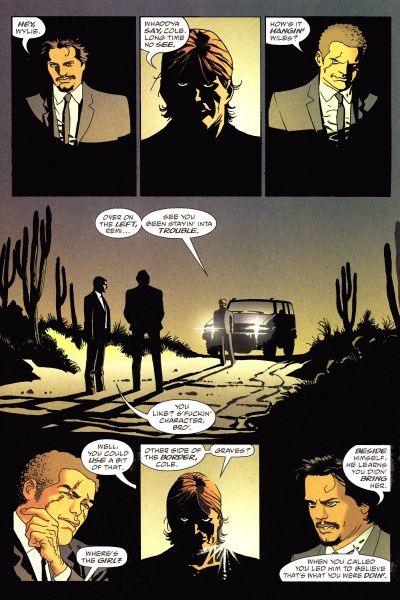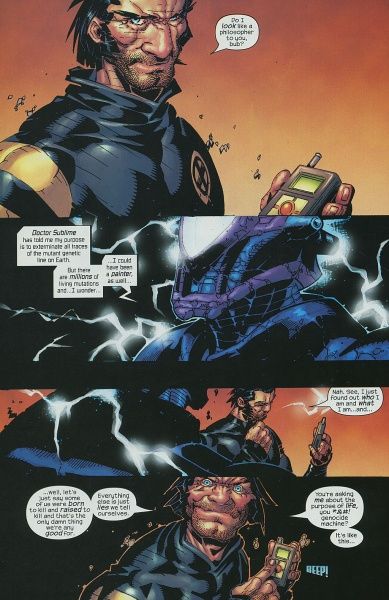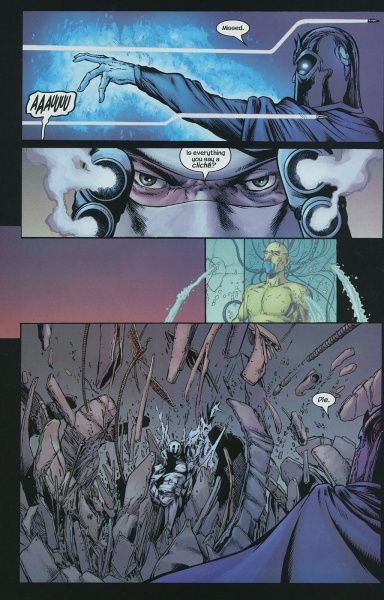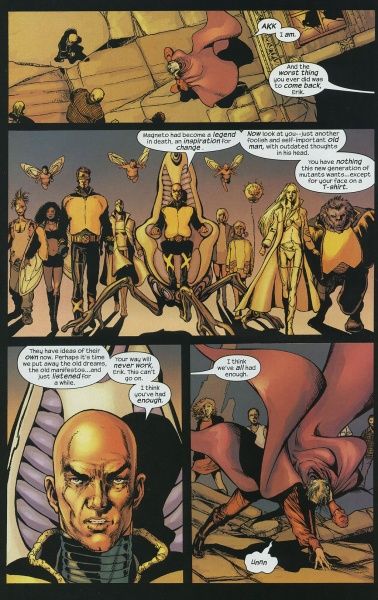I hate a comic book that you only have to read once.
No, wait, that isn't true. To be honest, I love comics that you have to read more than once so much that it sometimes seems like I hate one-time use comics.
Let me back up. I'm David Brothers, and I blog at 4thletter with my buddy Gavin. I've got the distinct pleasure of living in San Francisco now, home to the best comic lounge in the world. My first comic was Amazing Spider-Man 316. I took a break from reading comics right around the time Onslaught and the Clone Saga hit, which also coincided quite nicely with my discovery of girls. I didn't come back until 2002, when I picked up a Daredevil Visionaries: Frank Miller volume. I was an English major in school, which will explain everything or nothing about this essay, depending on your point of view. Brian asked me to do this back in May, I believe, I procrastinated and avoided it for months, since I really wanted to do CBSG justice.
My three favorite writers, in no particular order, are David Mack, Brian Azzarello, and Grant Morrison. These three writers couldn't be more different. Mack writes cerebral comics, Azz writes comics that are dipped and coated in grime and crime, and Morrison excels in madcap action and new ideas. One thing that they've all got in common, though, is that each of their comics are even more rewarding on a reread. You can pick up things you missed on the first go-round, or even come up with an entirely new, and equally valid, reading.
Look at Kabuki. On one level, it's about a female ninja assassin rebelling against her corporate/government masters and killing kind of a lot of people. That's perfectly fair, as that is pretty much what the book is about. Kabuki, the central character, is a female ninja assassin who rebels against her masters and kills a lot of people.
On the other level, Kabuki is a book about a woman who finds out that her identity was so wrapped up in her occupation that, after leaving it, she found herself completely unable to function. It's about building up a new and better Kabuki, one who understands and can grow into her new identity. She has been struggling to find that place where she belongs throughout the series. She has to reconcile her past, present, and future to get there.
The entire series, from Circle of Blood to The Alchemy, is an interesting look at what makes a personality. Just because you have the name does not mean that you are that name, if that makes sense. Kabuki is faced with her evil twin, of sorts, midway through the series. This woman has studied Kabuki, and even attempts to act like her. Her walk, cadence, and style are all reminiscent of Kabuki-- but she isn't Kabuki.
100 Bullets is similarly layered. It's a series where every little fact connects like a jigsaw puzzle. Characters that you see in the background of certain scenes come back into play later on in the series. The allegiances of various characters twist and turn as time goes on.
Azz and Risso's series can be confusing, but that's half the fun of it. Spotting where the pieces fit is as vital a part of the series as reading it. It's a water cooler book, of sorts. It's the kind that begs to be dissected and kibbitzed over. What's Graves's big plan? How does Dizzy fit in? Is there any chance of a happy ending? In order: revenge, failsafe/murder, and no.
Azz's dialogue is a reflection of the series. Characters don't speak in Claremontisms, where every single line of dialogue is like a statement of intent. Instead, characters talk more like they do in real life, only much more clever. They're guarded and reserved, and their words are often opaque. Reading 100 Bullets is sometimes kind of like translating an ancient holy text. Almost every word has a double meaning, and sometimes those double meanings have another meaning on top of it. If you don't have the 100 Bullets Decoder Ring (limited supply), you've got to put some real thought into the series.
(Click on the images to enlarge them)
Grant Morrison should need no introduction, especially on this site. I'm a card-carrying member of Morrison's Whorrisons, of course, so you can guess where I stand on him. I think he's brilliant. The work of his I keep coming back to the most, save for Flex Mentallo, is New X-Men.
I grew up on X-Men. Toddy Mac's Amazing Spidey was my first, but Jim Lee's X-Men captured my heart and mind. It was cool. And then, Grant Morrison came along ten years later and made it cool again. There were some great plot twists, clever stories, and it was all wrapped up with a neat bow in the end. Take a closer look, though, and you find commentary lurking below the office. Wolverine says something important in Assault on Weapon Plus.
Nah. See, I just found out WHO I am and WHAT I am... and... well, let's just say some of us were BORN to kill and RAISED to kill and that's the only damn thing we're any GOOD for.
Everything else is just LIES we tell ourselves.
You're asking me about the purpose of LIFE, you **** genocide machine? It's like this..."
Sure, Logan is talking about his own life. He's been bred to kill and that's all he knows, despite the pretensions and airs he puts on. He'll never be anything more.
Remove it from the comic page for a minute and check it out on a macro level. It's a direct commentary on the X-Men, and probably even superhero comics in general. Morrison's New X-Men pushed the franchise in new directions and built on the potential that Claremont laid down and then kind of left hanging. New X-Men was just that-- new. But, it wasn't going to stick. The X-Men began as a group of mutants fighting to protect a world that fears and hates them and that's how they're going to stay. Having the mutants become a genuine subculture kind of gets a little too far away from that. The X-books were designed to be soap opera and that's all they'll ever be. Everything else is just a lie that the X-books tell themselves, get it?
There's a ton of commentary to be found in New X-Men, but none of it is more blatant in the treatment of Magneto. He creates a new persona, Xorn, who everyone likes. He's a true hero and a healer. By the end of the series, Magneto returns and pulls off his big supervillain plot.
What's the response he gets?
Deafening silence.
He takes over Manhattan, he pulls an old plan out of the drawer, and gets ready to wreck things. The people respond with apathy. Who cares, didn't Magneto die? How do we know that this is him? Why should we care? Even the heroes that come against Magneto get into it. I could quote it all day, chapter and verse, but here are two that I think are the most relevant.
Fantomex drops in, firing bullets at Magneto. "Missed," Magneto says. "Is everything you say a cliche?" asks Fantomex.
Xavier puts the nail in the coffin.
Magneto had become a legend in death, an inspiration for change. Now look at you-- just another foolish and self-important old man, with outdated thoughts in his head. You have nothing this new generation of mutants wants... except for your face on a t-shirt."
They have ideas of their own now. Perhaps it's time we put away the old dreams, the old manifestos... and just listened for a while. Your way will never work, Erik. This can't go on. I think you've had enough. I think we've all had enough."
Now, tell me that isn't commentary on the X-Men at the same time it's Xavier dissing Magneto!
This is why I love comics that dare to be more than continuity porn for 22 pages. They turn out to be entire meals, rather than brief tastes. You can read them over and over, find new things, and talk them over with friends.
I was an English major in school, but I think I had the most fun with it in high school. We were constantly discussing and interpreting poems (I'm a big fan of Frost) and novels (such as The Stranger/Outsider). We asked questions about the text, strove for a deeper understanding, and had a lot of fun with it.
Being able to apply this to comics is wonderful. Comics are literature, just like any other book. Correction-- they can be literature. Corporate comics tend to be very surface level, lowest common denominator types of comics. Corporate comics have to sell, and that's what sells. There's nothing wrong with that at all, but sometimes you have to have more than that.
I love comics that feel like they're worth my money. If I'm reading a comic in five minutes and never picking it up again... well, that's not worth it. I'd much rather be able to read and chew over a comic than just take it in once and leave it be, never to think about it again, or until the next issue hits. I'm still talking about Batman #666 with friends. The latest issue of Detective Comics or Countdown?
Not even close.
Comics that use metaphors, layers, and interesting concepts to successfully extend their lifespan? Those comics are good. Comics should be good, right?





